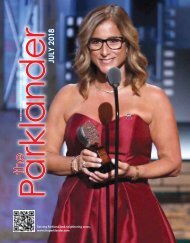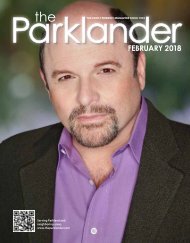March 2018
You also want an ePaper? Increase the reach of your titles
YUMPU automatically turns print PDFs into web optimized ePapers that Google loves.
LAW<br />
Presuit Divorce Mediation:<br />
by H. Mark Purdy, Esq.<br />
The benefits and how it works<br />
Only twice was I financially<br />
ruined: Once when I lost a<br />
lawsuit, and once when I won a<br />
lawsuit.<br />
Voltaire (1694-1778)<br />
Whatever you do, keep out of<br />
court. For it’s being ground to bits<br />
In a slow mill; it’s being roasted<br />
at a slow fire; it’s being stung to<br />
death by single bees;<br />
It’s being drowned by drops; it’s<br />
going mad by grains.<br />
Charles Dickens,<br />
Bleak House (1852)<br />
The sharp wit of Voltaire and the flowing<br />
prose of Dickens articulate a present day<br />
truth — that it is very wise to consider<br />
alternatives to litigation to resolve<br />
conflicts. In recent years many forms<br />
of Alternative Dispute Resolution (ADR)<br />
have been utilized, but none more widely<br />
accepted than mediation. In no other<br />
circumstances is the need for “a better<br />
way” truer than when faced with the<br />
potentially devastating emotional and<br />
financial consequences of divorce.<br />
This article will provide an explanation of<br />
the rapidly growing form of ADR known<br />
as presuit, pro se (without lawyers)<br />
divorce mediation. It is a simple, very<br />
cost effective, private process in which<br />
the parties themselves come to their own<br />
settlement.<br />
We start by understanding what<br />
mediation is and the role of a mediator.<br />
Mediation is a process in which the<br />
parties to a dispute utilize the services of<br />
a neutral third party - the mediator - to<br />
encourage and facilitate the resolution<br />
of disputes. It is designed to be the<br />
opposite of litigation, which involves<br />
rules of law and procedure, extensive<br />
formal discovery such as depositions,<br />
court imposed deadlines, multiple court<br />
appearances, the stress and uncertainty<br />
of surrendering the ultimate decision<br />
making authority to someone else, as<br />
well as the possibility of a post-trial<br />
appeal. In short, in litigation each party<br />
seeks to “win the lawsuit” by attaining<br />
complete “victory” at the expense of the<br />
other party. Mediation, on the other hand,<br />
is informal, nonadversarial, private, and<br />
confidential. The issues to be resolved<br />
are treated as mutual problems to be<br />
solved by the parties, to their mutual<br />
satisfaction.<br />
The role of the mediator is critical and<br />
parties facing divorce should carefully<br />
select an experienced mediator who<br />
is Florida Supreme Court Certified in<br />
Family Mediation. First and foremost,<br />
the mediator is bound by strict ethical<br />
standards of neutrality and impartiality.<br />
The mediator does not serve as legal<br />
counsel for either or both of the parties.<br />
The mediator does have a very active<br />
and essential role in the process and<br />
is often referred to as a “guide” to the<br />
parties. The mediator is ethically allowed<br />
to provide information that the mediator<br />
is qualified by training or experience to<br />
provide. In divorce mediations there are<br />
multiple, often complex issues to be<br />
resolved, such as property distribution,<br />
alimony, and children’s issues. Therefore,<br />
the mediator creates an agenda so that<br />
issues are discussed in a logical order<br />
and within realistic parameters. Assisted<br />
by the mediator, the parties develop a<br />
better understanding of the issues and<br />
their options. The mediator can suggest<br />
alternative solutions that the parties<br />
might not have considered. The mediator<br />
always encourages and facilitates<br />
communications between the parties and<br />
seeks to remove barriers due to lack of<br />
communication.<br />
Full settlements are usually reached<br />
after a few mediation sessions. At that<br />
point, the mediator assists the parties<br />
in completing a written settlement<br />
agreement as well as all other paperwork<br />
necessary to obtain the Final Judgment<br />
of Dissolution of Marriage. P<br />
H. Mark Purdy, Esq., is a former Broward<br />
County Court Judge and Circuit Judge.<br />
He is a Florida Supreme Court Certified<br />
Family Mediator and a principal in<br />
Mediar, Inc.<br />
62<br />
MARCH <strong>2018</strong>

















